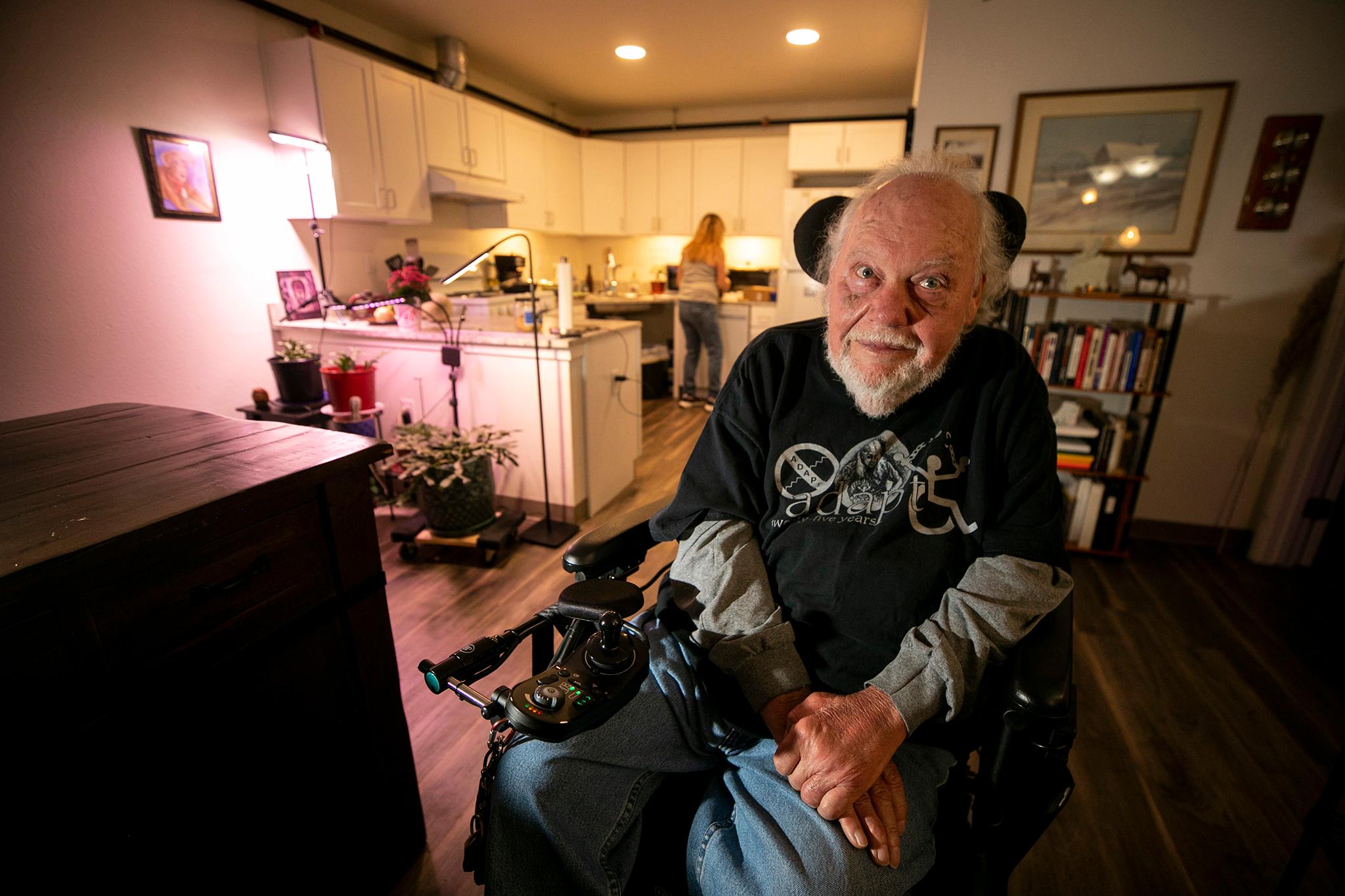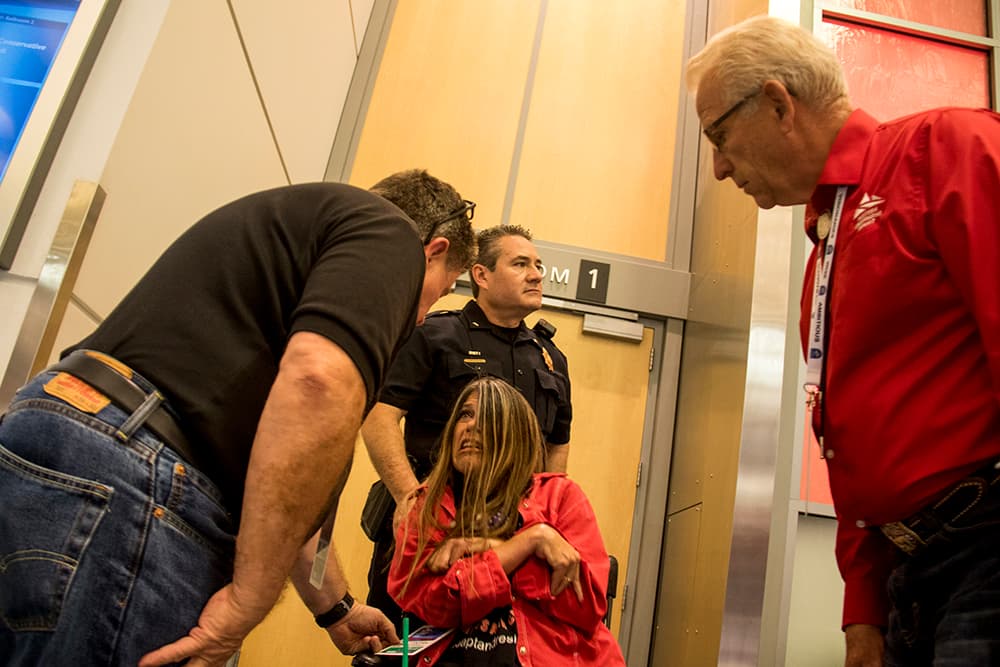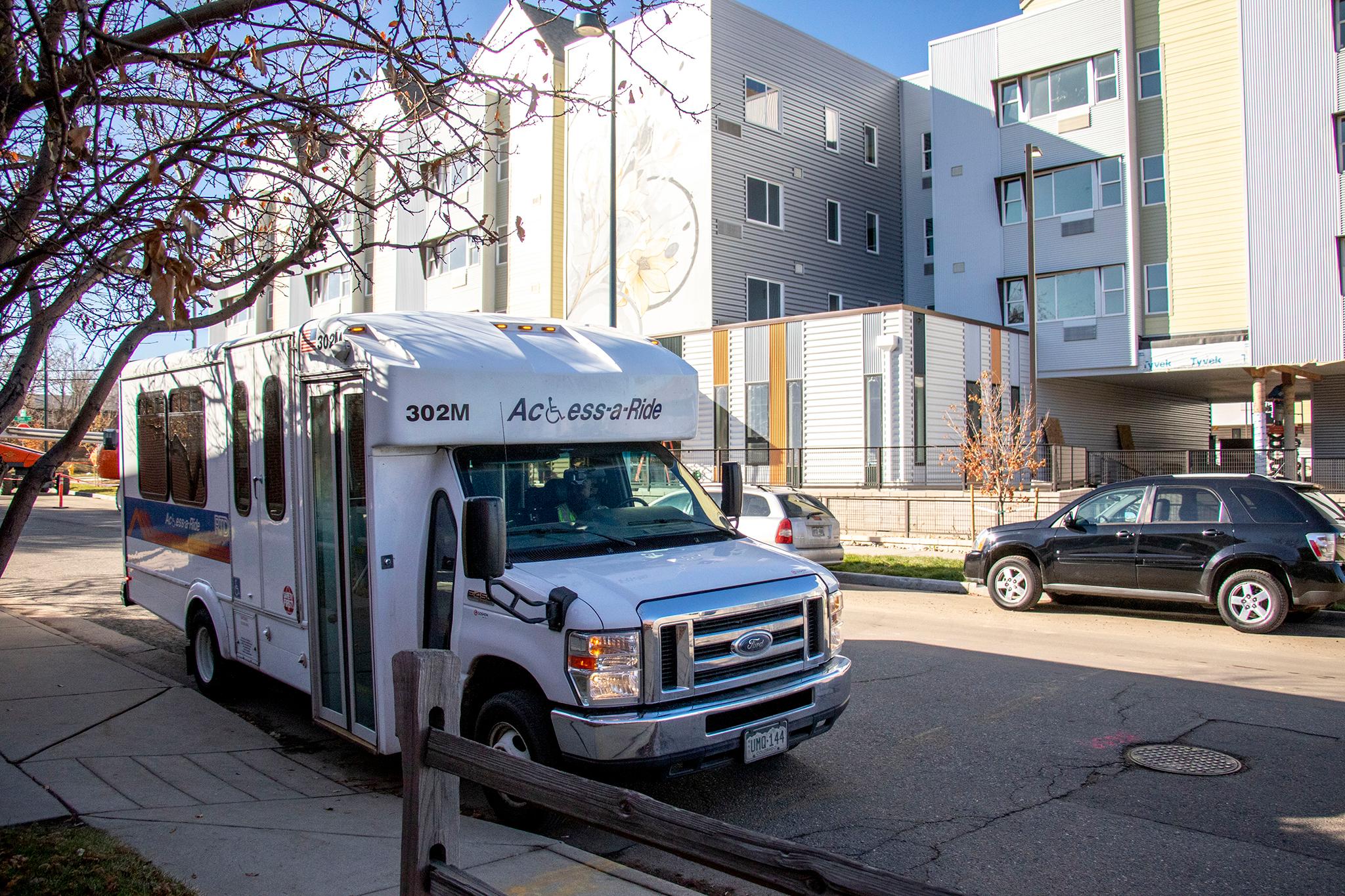Joe Beaver had just left a performance at the John Hand Theater in Lowry, and it was time to get back home.
For Beaver, who uses a wheelchair, getting to the theater was rather easy. He'd booked a ride in advance with RTD's Access-a-Ride program that serves people with disabilities who cannot always use the bus system. It took about a half hour to make the 12-mile trip from his home to the theater.
Beaver had pre-scheduled a trip home, as the service requires, to pick him up from the play. But because the performance ran a bit longer than he expected, the Access-a-Ride van could not wait for him and he ended up stranded in Lowry.
It took him four hours to get home.

For some people with disabilities, RTDs accessibility services work well. But people in wheelchairs, like Beaver, have ended up stranded for hours.
When Beaver realized he'd missed his ride, he had two choices: join RTD's on-call list, which could take hours, or order a ride-share through Access-on-Demand, a newer program that lets Access-a-Ride passengers use on-demand ride-shares as an alternative. RTD pays for the first $25 of the trip.
Beaver called an Uber and requested a Wheelchair Accessible Vehicle (WAV) and was told a driver would arrive in 19 minutes. After waiting that long, the Uber app told him no drivers were available. So he ate dinner nearby with a friend, checked again, and still found no drivers. He headed to the bus stop, where the regular six o'clock bus failed to arrive.
"We sat there in the misting rain for an hour," Beaver said.
He caught the next bus, wheeled himself down Colfax in the heavy rain to make his transfer and finally got home.
Because private ride-share companies are not required to provide WAVs, on demand services are often less accessible to people like Beaver.
Wheelchair users who qualify for Access-a-Ride either have to wait long periods of time for an available WAV, or stick with Access-a-Ride, which requires advance planning.
The original Access-a-Ride program that Beaver had used to get to the theater serves multiple passengers in one trip, so travel typically takes longer than going directly. It also means travelers must schedule their rides in advance. As Beaver experienced a few weeks ago, the program does not provide much room for flexibility beyond a few minutes. The trip also costs passengers $5 each way (though all RTD rides are free this summer during July and August).
That's why RTD launched a pilot program in 2021, partnering with Uber, Lyft, zTrip and Metro Taxi. Users enrolled in Access-a-Ride can book trips through ride-share partners. The new program is often cheaper for both travelers and RTD. Access-a-Ride costs RTD an average of $60 to $70 per trip, compared to a max of $25 per trip with Access-on-Demand. RTD said the average customer's trip actually costs around $16.
But because companies like Uber and Lyft are not required by law to provide WAVs, the Access-on-Demand program is sometimes inaccessible to people in wheelchairs. RTD supplements the program with its own WAV vehicles, but users have still struggled to find WAVs when booking ride-shares.
Denver is not a city where the company provides wheelchair rides, according to Lyft's website.
"In Denver, we work with local companies to provide wheelchair-accessible transit options," wrote Lyft spokesperson Eric Smith when asked about wheelchair accessibility for rides in Denver.
Uber did not respond to Denverite's request for comment.
The companies offer some WAVs in cities across the country, but service and availability can be spotty. In 2022, a California federal judge ruled that Uber does not have to offer wheelchair accessible vehicles, with Uber arguing that providing WAVs would be too expensive and not possible in some parts of the country.

Still, RTD's accessibility services have grown in usage and popularity with area riders.
Paul Hamilton, Senior Manager of paratransit services at RTD, said the program has seen fast growth, with almost 5,000 current riders. He said that in December, about 20% of trips using RTD's accessibility services were booked on ride-shares. Now, that figure is at 40%. Hamilton said WAVs are contractually obligated to arrive within 30 minutes, and that as demand grew in July, the average wait time rose from 25 to 30 minutes.
In response, Hamilton said RTD has increased the number of WAVs it has made available to ride-share drivers to provide Access-on-Demand-Services and is working to better position WAVs out in its coverage area.
"That's extremely quick growth and what we experienced as a result of that is we didn't have enough vehicles out there initially, and we really saw that by about the middle of last month as ridership utilization surged," he said. "Since then, at the end of June, and we continue to monitor it, we've added almost twice as many WAV vehicles out there."
Still, some Access-on-Demand customers that use wheelchairs said they were unable to book WAV trips on-demand.
A few weeks ago, Dawn Russell waited hours for a wheelchair-accessible Uber she booked through RTD's Access-on-Demand program.
Russell has also encountered problems with the original Access-a-Ride. Two weeks ago, she scheduled a pre-planned Access-a-Ride trip for 7:40 a.m. to take her to the airport. Come 9 a.m., the ride had still not arrived. Russell said she waited on hold for nearly 30 minutes with RTD, and ended up missing her flight.
Russell is a member of ADAPT, a disability rights group, and a long time accessibility activist. She said wants to see better customer service from RTD when riders are troubleshooting problems in the moment.
But she added that Denver has come far when it comes to accessibility since 1978, when a group of protesters in wheelchairs called the "Gang of Nineteen" stopped traffic to protest inaccessible buses. The protest prompted RTD to update buses with wheelchair lifts and helped lead to the Americans with Disabilities Act; RTD recently commemorated the action by rededicating a plaque at Civic Center Station.
"I am thrilled at the fact that I have multiple ways to travel, when just this exact time in history in 1978, people with disabilities could not get on a bus," she said. "Today, we can get on that bus and we can get on an Uber and whatever else."

But everyday travel to places like the airport or an office can quickly become difficult for people who rely on RTD's accessibility services.
"There's not one person who uses either one that hasn't had an issue," said Jamie Lewis, a wheelchair user and advocate with the Colorado Cross-Disability coalition. He does not try to book ride-shares through the Access-on-Demand program because he knew he would likely get stuck waiting for a WAV.
That means Lewis typically uses Access-a-Ride, requiring careful planning and scheduling; there is little room for running late or taking unplanned trips. Even when passengers are perfectly on time, Access-a-Ride sometimes keeps them waiting.
Lewis is in his 60s, and has worked his own schedule for the past 20 years. He does not have a workplace he must report to on time, and said it is "no big deal" if transportation issues make him late.
"I couldn't imagine somebody who has to work a traditional 9 to 5 job, and we do have people in the disability community that do work," he said. "I don't know how they get to work on time, or what flexibility the employer gives them. If they don't give them flexibility, they're in trouble. I know a lot of people that just gave up on working because they couldn't find decent transportation."
Disability rights advocates want to see RTD work to improve the original Access-a-Ride system, and work toward better on-demand services that serve people in wheelchairs.
Since some Access-a-Ride customers can book RTD rides through private ride-shares, Lewis said he expected ridership for the original group rides to go down, letting RTD focus on improving that service. But he said he still sees a range of issues with both services.
RTD director JoyAnn Ruscha mentioned the WAV problems at a recent RTD board meeting. She wants RTD to better track wait times and travel issues for people who use wheelchairs.
"I want the on-demand program to succeed. It provides an incredible benefit to a lot of our customers, and I don't want it to fail or to get scaled back because we couldn't figure out the wheelchair accessibility piece," she said. "The folks who use the services and the folks who sit on our accessibility and advisory committees, they should be helping to shape this program."
Hamilton said RTD is working on improving the program.
"We're still not at a place where we could say we're perfect, or where we want to be... We're seeing a lot of customers call us back, or during our advocacy meetings we are hearing our customers say, 'We have this problem or that problem,'" he said. "However, overall, we love the program."












